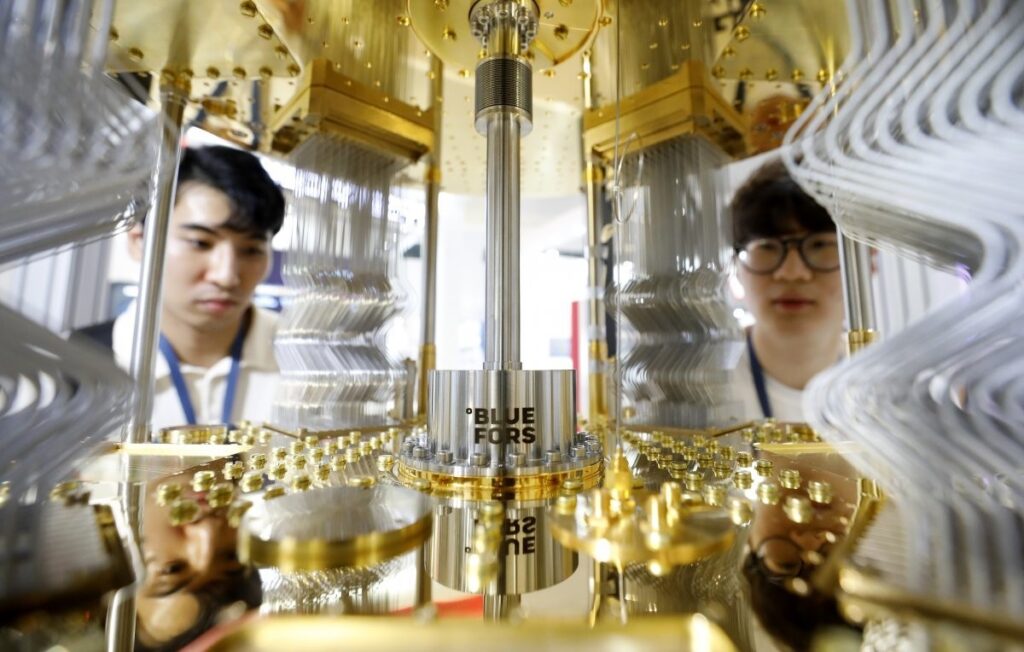Jiwon Choi, Jimin Koo
Entered: 2023-06-27 03:00 Updated: 2023-06-27 03:00
Opening of ‘Quantum Korea’ event at DDP
Participation of 50 foreign companies, research institutes, etc.
Exhibition of quantum computers under development in Korea
Government invests 1 trillion won in R&D for 8 years
“I will make it the first year of a great leap forward in quantum technology.”
Dongdaemun Design Plaza (DDP) in Jung-gu, Seoul on the 26th. On this day, ‘Quantum Korea 2023’, the largest international quantum event in Korea, opened at DDP. Quantum Korea is an event that expands and reorganizes the Quantum Information Week held by the Ministry of Science and ICT since 2020, and more than 50 investment and research institutions, including global companies such as the United States, France, and Israel, have participated.
Domestic quantum research institutes presented the current state of quantum technology to visitors at the exhibition booths prepared at the event. The Korea Institute of Science and Technology (KIST) exhibited a diamond-based quantum computer that day. Quite a few quantum computers currently being developed need to maintain a cryogenic state of -270 degrees Celsius to maintain a stable state, but diamond-based quantum computers can operate even at room temperature.
KIST senior researcher Jeon Seung-woo explained, “We have implemented it up to the level of 5 qubits, and we are at the stage of checking whether it can be used for actual calculations.” Existing computers use ‘bits’ that have a state of 0 or 1 as a unit of operation, whereas quantum computers use ‘qubits’ that can have both 0 and 1 states.
At the exhibition hall of the Korea Research Institute of Standards and Science (KRISS), the achievements of developing a superconducting quantum computer were exhibited. The superconducting method is based on semiconductor technology. KRISS itself aims to develop a 50-qubit quantum computer. If it succeeds in developing a 50-qubit quantum computer, it will be the third achievement worldwide after the United States and China.
The government plans to secure global competitiveness in the fast-growing quantum technology market with Quantum Korea as an opportunity. According to a report released in April by McKinsey, a global consulting firm, the quantum technology market is expected to grow to $106 billion (approximately 138.754 trillion won) by 2040.
Governments of major countries have already invested large amounts of budget in the quantum field and are competing fiercely to preoccupy the future quantum market. According to the Ministry of Science and ICT, the United States is already investing more than 1 trillion won annually in the field of quantum technology. The UK announced a national-level bilateral strategy in March and announced that it would invest 2.5 billion pounds (about 4.15 trillion won) over 10 years from 2024.
Competition among big tech (large information technology companies) for leadership in the quantum field is also getting fiercer. In the meantime, following IBM and Google, which have preemptively announced new quantum technologies and strategies, Microsoft (MS) is also fighting back in the quantum field in earnest.
Earlier, on the 14th, IBM published a paper that demonstrated results that exceeded the performance of general supercomputers on a scale of 100 qubits as a cover paper in the international journal Nature. Previously, it was predicted by the academic world that a quantum computer with a performance of 1,000 qubits or more would be needed to surpass existing supercomputers.

In 2019, Google announced the achievement of solving an operation that would take 10,000 years with a conventional supercomputer in 3 minutes and 20 seconds with a 53-qubit quantum computer. The goal is to put quantum computers into practical use by 2030. On the 21st (local time), Microsoft said, “We will develop and release a reliable and practical quantum computer within 10 years.”
Korea has also taken steps to narrow the technological gap with major countries. The government has applied for a preliminary feasibility study in April of this year for a quantum science technology research and development (R&D) project that will invest a budget of 996 billion won for eight years from 2024. The goal is to develop a 1000-qubit quantum computer by 2031.
World-renowned scholars also visited the event. The congratulatory speech was given by Dr. John Clauser, who proved the quantum entanglement phenomenon through experiments. Keynote lectures were also given by distinguished scholars such as Professor John Martinis of the University of California, Santa Barbara, and Professor Kim Jeong-sang of Duke University.
Joo Young-chang, head of the Science and Technology Innovation Division at the Ministry of Science and ICT, said, “We will increase our competitiveness by concentrating our national capabilities in the field of quantum science and technology.”


